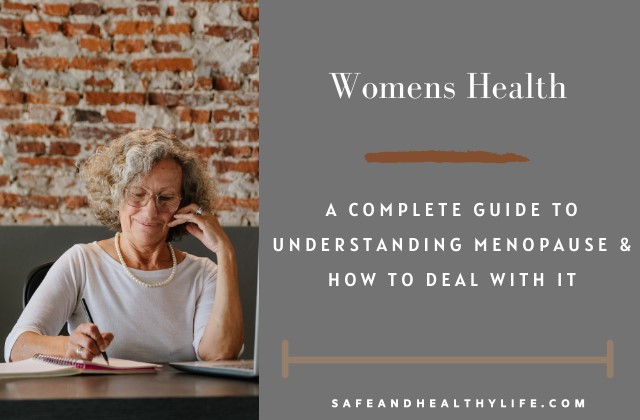
Mostly occurs after the age of 30 or early 40s. The estrogen production keeps on decreasing as a woman ages.
There are two factors believed to cause menopause, and these are hormones and reduced egg production in a woman’s reproductive system as she ages.
Every woman going through menopause will experience different symptoms. They include hot flashes, mood swings, sweating at night, fatigue, and irritability.
At this stage, you are also at risk of contracting illnesses such as obesity, diabetes, osteoporosis, and heart disorders.
The big question is, how can one alleviate symptoms of menopause or prevent themselves from the risk of these diseases? Of Course, there are supplements like Menoquil readily available in the online market.
1. Focus on Healthy Eating Habits
There are numerous eating habits that you can focus on and stick to during menopause, and each comes with a different benefit, as detailed below.
- Go for Food Rich in Vitamin D and Calcium
Your bones may tend to weaken due to hormonal imbalance during menopause — this increases the risk of contracting osteoporosis.
You need food rich in these two nutrients in your body since they are known to improve bone health.
For calcium, take dairy products such as cheese, milk, or yogurt and leafy vegetables such as spinach, kale, or collard greens.
For vitamin D enhancement, consider skin exposure to sunlight or foods such as eggs, fish, and cod liver oil.
- Avoid Taking Trigger Foods or Drinks
You know that menopause comes with night sweats, mood swings, and hot flashes, and there are diet trends that tend to accelerate these symptoms.
They include alcohol, caffeine, or any spicy food. Different types of foods and drinks might impact women differently, and you need to monitor your body’s reaction to each. You might opt to reduce the intake or drop them altogether.
- Take Different Types of Fruits
Fruits are known to reduce different symptoms that come with menopause.
To begin with, they are low in calories, and you will feel full most of the time, meaning it is a perfect diet for weight loss and maintenance.
Fruits are also known to prevent bone loss and heart diseases, which are risk factors during menopause.
- Take Foods Rich in Phytoestrogens
Phytoestrogens are nutrients that naturally occur in some plants, and they tend to produce the same effect estrogen brings to women’s bodies.
It may, therefore, be used to bring hormonal balance. This nutrient is found in foods such as tofu, soybeans, flax seeds, beans, linseeds, tempeh, and sesame seeds.
Most of the diets rich in these foods can also help in reducing cholesterol levels, the severity of night sweats or hot flashes, and blood pressure.
- Avoid Taking Processed Food and Refined Sugar
Too much refined sugar and carbs can lead to fatigue, high blood sugar, irritability, and depression to some women during menopause. Highly processed foods are also a big risk to your bone health. You should minimize their intake or avoid them altogether.
- Take More Foods Rich in Proteins
Proteins are known to build muscles in our bodies, and when you embark on taking more foods rich in proteins, you will protect yourself from extreme loss of lean muscles.
The more you grow old, the more you lose your muscles, and this is why you should consider more protein intake. It also helps with weight loss. Such foods include eggs, nuts, fish, meat, legumes, and dairy products.
2. Natural Supplements Are a Perfect Remedy
Most women across the world rely on natural supplements to relieve the symptoms of menopause.
You can buy menopause supplements over the counter or through online stores. And while there is no strong evidence of their effectiveness and safety, they have proven to work for some women.
Some of the supplements you should consider are phytoestrogens, black cohosh, prebiotics, DHEA-S probiotics, Dong Quai, and kava, among others.
3. Exercise Regularly
Working out before and during menopause is beneficial to your body in different ways.
You will experience enhanced metabolism, healthier bones, strong muscles, better sleep, and reduced stress.
With regular exercise, you will feel less fatigued, irritable, and experience minimized night sweats and hot flashes as well. It also helps you to lose weight while improving both physical and mental health.
4. Always Keep Your Body Hydrated
Due to reduced levels of estrogen, most women experience dryness during menopause. Therefore, you should take at least eight glasses of water every day.
Taking water decreases the chances of bloating, which occurs with hormonal imbalance.
Again, you all know that water aids in weight loss, which is one of the goals you must work on to prevent obesity.
Bottom Line:
Remember that menopause should not be taken as an illness – it is a normal stage of life.
And while some of the menopausal symptoms are diffiVery few women want to hear or talk about menopause openly, but the fact remains that it is a stage in life that nobody can skip.
Now, menopause officially begins when a woman’s menstrual periods stop happening completely.
In most women, it will occur in their early 50s or late 40s to a few.
However, the entire menopause process begins from the late 20s, whereby the menstrual cycle starts to shorten gradually towards perimenopause.
Perimenopause is a menopause transition period that cult to deal with, this ultimate guide will help you alleviate their impacts.
About The Author:
Helen Cartwright is a passionate blogger, who excels in the Digital Marketing and Technology niche. When not wired in marketing strategies she ghost-write for a variety of authors who have their work published on leading online media channels such as The Huffington Post and Entrepreneur.com.




